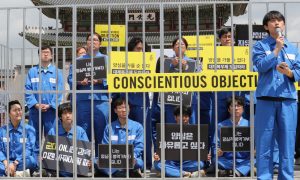THE Koreans were determined. They were not going to lose this chance of winning the hearts of visiting Olympic athletes, tourists, and millions of worldwide television spectators. Toiling for seven years, they invested over three billion dollars in the project.
They poured their heart and soul into making the 1988 Seoul Olympics a success. Over 26,000 volunteers pitched in to help. As many as 240,000 ordinary citizens cleaned the streets. They closed 2,200 public baths so that smoke from the chimneys would not affect the marathon runners. Yes, they willingly adjusted their daily routine to host the biggest Olympics in history with over 9,500 athletes from a record 160 participating countries. As a result, they won prestige as a developing industrial power capable of hosting the games.
Winning the Commercial TV Olympics
The games meant by far the greatest success for Korean businessmen, who invited their customers from all over the world. Their frantic search for the “platinum paper,” the admission ticket for the opening ceremony, meant easy money for scalpers selling a first-class admission ticket at over 20 times the original price. The Olympics also opened up for the Koreans new business dealings with Eastern European countries. Not to be dismissed lightly was the publicity the Olympics gave to Korea as a leading power of newly industrialized countries. “One hundred eighty hours of (NBC) telecasting!” exclaimed a Korean businessman, as reported in the Los Angeles Times. “It’s unimaginable how much it would cost to buy that much advertising for Korea.” And the American National Broadcasting Company reportedly paid 300 million dollars to get that favor.
With that money, however, the American network gained a voice in the Olympics. An executive of the Korean Broadcasting System told Awake!: “In the major sports that are popular in the United States, there was some adjustment of schedules for the finals and for competitions in which U.S. athletes participated. By shifting such competitions to the 9:00 a.m. to 2:00 p.m. period, Seoul time, they were made to coincide with prime time in New York.” All of this at the cost of inconveniencing the participants. To be ready for such early games, some had to wake up at 5:00 a.m. “It is understandable,” explained the executive, “in the sense that the Olympic Games are now mainly sustained by the fee from television rights, and 75 percent of this contribution is made by the U.S. network.” The average viewing rate, however, was below expectations, which meant a loss of profit for NBC because of their guarantee to advertisers.
Winning and Losing
“No Question at All!” This was the headline of Japan’s Mainichi Daily News on the day after Canadian Ben Johnson’s victory in the men’s 100-meter dash. A few days later the same paper retracted by running the headline: “World’s Fastest Dash From Fame to Shame.” Johnson had tested positive for doping with anabolic steroids and was stripped of the gold medal for which he had worked and trained so hard.
In the 100-meter race, the world’s fastest man succumbed to the temptation to take drugs. That “was a blow to the Olympic Games and a blow to the Olympic Movement,” said the president of the IOC (International Olympic Committee). For those caught for doping, their efforts to win at all costs included having their medals stripped from them. Altogether, ten doping cases marred the 1988 Olympics.
However, “only the uninformed get caught,” says U.S. shot-putter Augie Wolf as reported in Newsweek magazine. “I feel sorry for Ben Johnson,” said a Soviet coach, according to Newsweek, “but maybe 90 percent . . . use drugs. Ben Johnson’s mistake was getting caught.” On the other hand, Edwin Moses, a U.S. hurdler, gives his educated guess that “at least 50 percent of the athletes in the high-performance sports” would have been disqualified had they not outwitted the doping tests. If so many athletes believe that doping helps them, then why ban the drugs?
First, it is done to protect the spirit of fair play in the Olympics. Then there is the matter of protecting the athletes. Drugs in sports became a matter of serious concern when a Danish cyclist died of drug abuse in the 1960 Rome Games. More recently in 1987, Birgit Dressel, West Germany’s heptathlon medal hopeful, died from using some one hundred different drugs in her struggle to win the gold medal in her seven-events competition. Anabolic steroid, the “wonder drug” to develop muscles, can also develop problems in a user’s system—liver cancer, sterility, kidney damage, and heart trouble, just to name a few.
Then, why do athletes take drugs? “Doping has become a big problem in the Olympics due to the excessive desire for medals,” says Lord Killanin, former president of IOC. Yes, it is the win-at-all-costs mentality that drives athletes to drugs. And the motivating force behind all of it is money.
Money at All Costs
“In reality,” editorialized Japan’s Mainichi Shimbun newspaper, “the Johnson scandal occurred as the lust for money and fame in the sports world went to extremes.” Winning a gold medal at the Olympics enhances an athlete’s commercial value, thereby jacking up the appearance money he can command for future athletic competitions as well as increasing endorsements. Some also won state pensions and bonuses because of winning a gold medal. One country offered a bonus for gold-medal winners, amounting to 60 times the average worker’s monthly wage.
The Olympics are a lucrative business. The Korean organizers reaped a provisional profit of $349,000,000. Who is responsible for this commercializing of the games? “The International Olympic Committee (IOC), of course,” accused a Tokyo newspaper, Asahi Evening News. “The very people who ought to be upholding the Olympic spirit have allowed the Games to be turned into a commercial show.”
While trying to uphold the world’s highest level in sports, the IOC winked at the professionalization of athletes. In the revived Olympic event of tennis, it has tolerated “instant amateurs.” As long as millionaire professionals suspend commercial contracts for two weeks, stay in the Olympic Village instead of luxury hotels, and play free, they are considered amateurs.
Not all welcomed such a change in the Olympic principle. “It is unfair,” said Kuwait’s IOC delegate as reported in The Korea Times. “This will really take all sports events into commercialism.”
Finish Line Ahead?
Of course, not all athletes had the win-at-all-costs mentality, nor were they competing for money. One yachtsman who spotted a drowning participant gave up the race and rescued him at the cost of coming in 21st. Many were satisfied just to have taken part in the games. However, the overall emphasis was not on fair play and the “Olympic spirit” but on winning at all costs, even with the use of drugs. Speaking of the drug problem, U.S. athlete Edwin Moses said: “Sport, and perhaps the Olympic movement, has hit rock bottom.”
It is of interest to note why the ancient Olympic Games were terminated. “By the fourth century of our era,” explains the Seoul Olympic Organizing Committee, “the influence of politicians and the self-seeking wealthy brought corruption to the Games and they were abolished by [Emperor] Theodosius I.” Precisely these two factors, politics and money, have regained their prominence in the modern Olympics. Indeed, the win-at-all-costs spirit fueled by these factors only mirrors present human society. So all of us may well ask, Will there be a return to the true “Olympic spirit” by the time the games are held in Barcelona, Spain, in 1992, or will it still be win at all costs?





